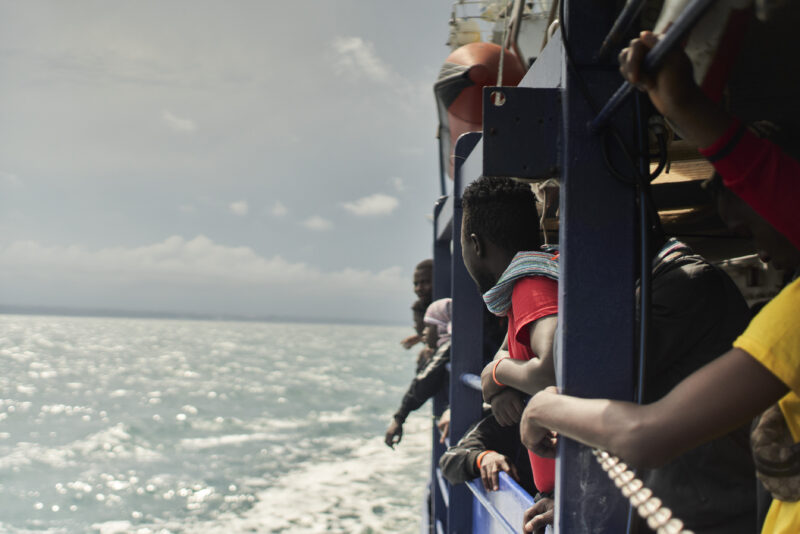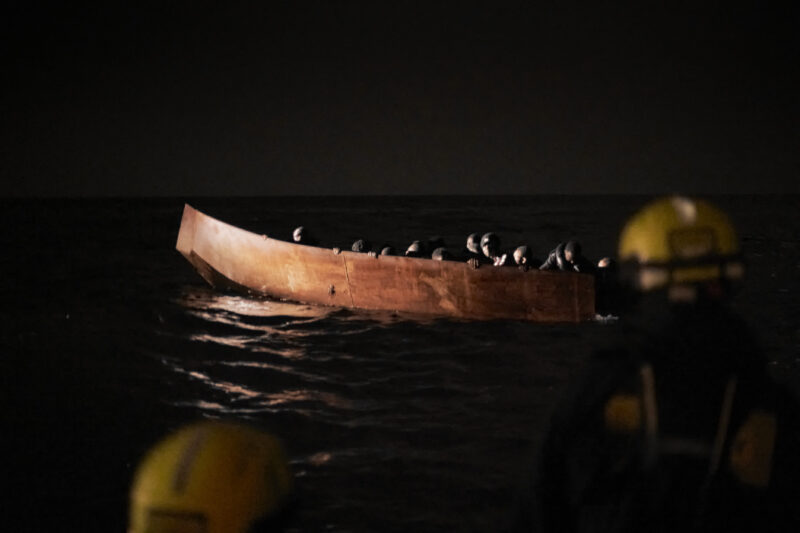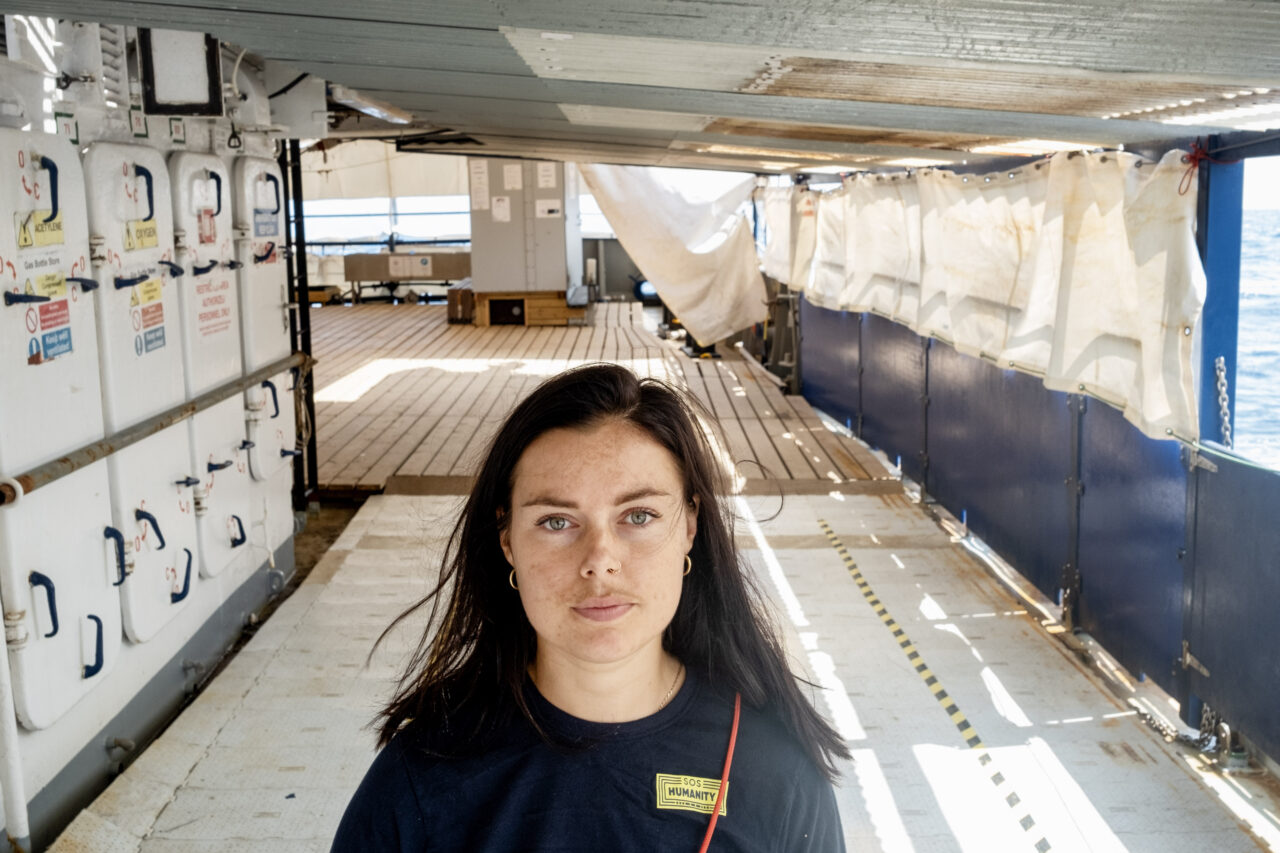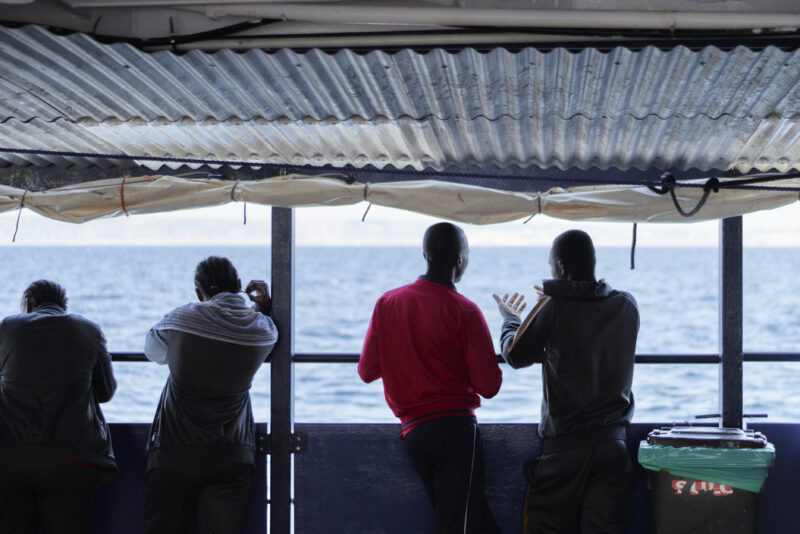Background Tunisia: Not a safe place for refugees

Survivors aboard Humanity 1 report grave human rights abuses in Tunisia as EU pushes deal with Tunisia on migration.
Trigger warning: The text explicitly describes different forms of (sexualised) violence.
“My wife was pregnant, and they hit her. They hit my wife, beat her up, she was bleeding down there, there was vomiting and everything, we went to hospital. The doctors told me there was no room for her. […] I lost my baby. I lost my baby because of the violence.” Demsy* from Ivory Coast was rescued by the crew of Humanity 1 in July 2023. Together with his wife, he fled Tunisia on a small, unseaworthy and overcrowded iron boat.
Tunisia is not a safe place for refugees. The testimonies of the people that SOS Humanity was able to rescue from distress at sea confirm this in a dramatic way. More than 400 people from nine boats in distress were rescued by the crew of Humanity 1 on their flight from Tunisia in July 2023 alone. On board the Humanity 1, they report violence and human rights violations in Tunisia. Since the racist speech of the authoritarian President Saied in February 2023, violence and discrimination against minorities and especially people from Sub-Saharan Africa has escalated. Mobs roam the streets and break into homes, sometimes armed with machetes. Because of their skin colour alone, people are beaten, robbed, abused, tortured and raped. Since the beginning of July 2023, Tunisian security forces have been deporting black migrants and refugees into the desert on the Libyan-Tunisian and Algerian-Tunisian borders – without access to water, food, sun protection and health care. Several deaths and numerous medical emergencies have already been reported. The mass deportations without due process of law are a massive violation of international law.

On board Humanity 1, Mariam*, who fled Tunisia, tells of daily and arbitrary violence in Tunisia: “The Tunisians see you, and just for a telephone, when you pass in the street, they will hit a woman. Often, if you’re just talking on the phone, they can stab you, threaten you with knives, and the police do nothing.”
Romeo* from Côte d’Ivoire, who also fled Tunisia and was rescued by the crew of Humanity 1, was brutalised before he fled and will face the consequences for the rest of his life: “One day, I was very ill and said I couldn’t go to work. They took an iron bar and started to hit me, it tore my skin right here [showing various scars]. I had to protect my face because otherwise it would have blinded me […] I often feel the pain. And I’m not going to show you everything because I lost a lot of things. One of my testicles was destroyed. That’s what they did. One is destroyed, only one is left.”
Accounts from rescued people also confirm that injured or pregnant women are denied access to health care. Ange* from Ivory Coast, who made the crossing in a small, unseaworthy and overcrowded iron boat, tells the crew of Humanity 1: “If you are black and you go to a hospital, you will not be considered for treatment. You will die there. Even if you’re pregnant or you’re there with small children, they don’t treat you. Tunisia is a terrible country. We cannot live there. That’s why we took to the Mediterranean Sea with the children.”

“Among those rescued were also many survivors of sexual and gender-based violence,” explains Olive, protection officer on board, who documented other numerous cases of sexual and gender-based violence in addition to the direct testimonies:
“I am talking about forced marriage, child marriage, women who are survivors of repeated instances of sexual assault. The fact that these women are stuck in Tunisia is a critical situation. They are a group that is disproportionately affected by violence at every stage of migration.”
European closed-door policies exacerbate violence – EU deal with Tunisia on migration must end
Despite the human rights violations, the EU – under the auspices of the EU Commission as well as the post-fascist government of Giorgia Meloni – is pushing ahead with a deal with Tunisia on curbing migration. A Memorandum of Understanding was signed in mid-July, providing for a “strategic partnership” of up to €1 billion for Tunisia, including €105 million just to strengthen cooperation on returns and border management with Tunisian authorities. The plans presented by the EU Commission and EU member states to declare countries like Tunisia so-called safe third countries also contribute to legitimising the violence and arbitrariness against people seeking protection in Tunisia. In doing so, the EU is supporting an increasingly authoritarian government that imprisons opposition figures, restricts freedom of expression and the rights of women, LGBTQI+ and other groups, and undermines the independence of the judiciary. Tunisia is neither a safe place for refugees and migrants nor for many Tunisian citizens.

The lack of safe escape routes and the restrictive migration policies of the European Union and its member states force those seeking protection onto increasingly dangerous routes. For more than a decade, the EU and its member states have supported the Tunisian state in controlling its borders and curbing migration to Europe.
Similar to Libya, the EU Commission and EU member states are in the process of normalising the systematic violence against people seeking protection. The EU intends to make Tunisia the border guardian of Europe – whatever the cost. By supporting the Tunisian border guard, the EU and its member states are hindering people’s right to leave any country (including one’s own country of origin) and their right to asylum. They are also complicit in human rights violations in Tunisia.
“The years we spent in Tunisia, we had no joy. If Europe could make us happy again, just take us as human beings, that would be fine, we are human beings. Black skin is no different. God gave us that. […] I ask only [that they] don’t see us like animals. We are human beings. […] If they cut me, it is blood which flows; if they cut you, it is blood. For me, it wouldn’t be green; for you, it wouldn’t be black. It’s the same blood, yes or no?” – Ange* from Ivory Coast.

In light of the documented violence and human rights violations against people seeking protection in Tunisia, SOS Humanity urges the EU and its member states to:
Ensure that people rescued from distress at sea are not returned to Tunisia. Tunisia cannot be considered a place of safety for people rescued at sea under applicable international law.
Not to participate in human rights violations and breaches of international law in Tunisia and at sea. By providing funds for Tunisian security forces, among other things, the EU is complicit in the crimes committed.
Any cooperation with Tunisia that leads to restrictions on refugee rights must end.
SOS Humanity, together with other organisations, has also signed a statement with demands to, among others, the European Commission, the Tunisian government and the United Nations, but also international organisations such as UNHCR and IOM.
*name changed and not shown in any photos.


